26
Jul 2006Dumb Joke in Shanghainese
After hearing lately about how YouTube is now the undisputed king of online video, I did a search for 上海话 (Shanghai dialect) to see what it would turn up. A measly two videos! Here’s the only one kinda worth watching:
Here’s a translation of the joke, in Mandarin and in English:
> 冰箱里有两只蛋在聊天
Two eggs were chatting in the refrigerator
> 一只蛋对另外一只蛋说
One egg said to the other:
> 你看 这只蛋傻吧
“Look at that egg. Doesn’t he look dumb?
> 身上长毛了
He’s covered in hair!”
> 然后那只蛋就发火了
The third egg was furious
> 就敲了它一下
and hit the first egg.
> 说 傻瓜 猕猴桃也不认识
He said, “You idiot! Don’t you know a kiwi fruit when you see one?”
Har har.
24
Jul 2006Learning Korean in China
Since I don’t have classes over the summer, I figured it was a good time to start learning something new. I started learning Korean. To fit Korean into my hectic schedule, I hired a Korean foreign student from ECNU to come to my apartment and tutor me once a week. Why Korean? Well, I have several reasons:
1. Korean looks cool. I’ve always liked it. I like the way it sounds, too (more than, say, that overrated language French).
2. Korean (mostly) uses a phonetic writing system. The last two languages I tackled seriously have been Japanese and Chinese, and let me tell you, I don’t have time for any more of this “memorizing thousands of characters” crap.
3. It would be great to have some ability in all three of the official languages of East Asia. With English and Spanish, I’ve already got most of North America, South America, Australia, and Europe covered.
4. Outside of Korea itself, China is a pretty good place to study Korean (see below).
Anyway, I have had three classes so far, and I’ve learned a few things:
23
Jul 2006The Chinese Work Ethic
I always think it’s kind of funny when I hear people talking about the “Chinese work ethic.” Usually it’s an American who knows plenty of successful Chinese immigrants in the States and just assumes that China is a nation of the same kind of people. It doesn’t take too much thought to realize that the hard-working Chinese immigrants in the States were able to immigrate to the States because they’re smart and hard-working, and so many of them are successful in the States for the same reason. (There are exceptions though.)
Of course there are hard-working Chinese in China too, but it is by no means a universal cultural trait. I thought I’d give one little story related to just one tiny facet of the complex “Chinese work ethic.” (The more I think about it, the more I think that the idea of a unifying work ethic for a nation as large and diverse as China is almost entirely meaningless, but I’m going to tell a story anyway.)
I left the subway station and took a shortcut down an alley on the way home. I passed by a low wall, and lying stretched out on the wall, sound asleep, was a young man. Judging by his appearance, he was a migrant worker. Next to him on the wall was an electronic produce scale, and just behind the wall was a big cart full of apples. It was late afternoon.
Right after I passed the sleeping guy, I saw another man and a girl coming down the alley towards me with another cart of apples. I guessed that they were working with the sleeping guy, so after they passed me I walked a few steps further and then stopped to observe what happened next.
Life for immigrants to Shanghai is not at all easy. Migrant workers have to work extremely hard for very low wages. I wasn’t sure what the relationship between the two men was, but I fully expected the older man to really let the young guy have it for sleeping on the job.
The older man stopped by the younger man and walked around to the other side of the wall, near the apples. I saw the young guy stir, and he noticed the older man. The older man said something, and I saw a smile spread across the young guy’s face. He slowly sat up, and the two men began chatting happily. The girl looked on, a big grin on her face.
21
Jul 2006Female Roommate Needed
No, not for me. A Chinese friend and former co-worker is looking for a roommate here in Shanghai. She hopes to find a female foreigner. No, she’s not a language rapist, she just finds foreigners interesting and enjoys their company. This is a great opportunity for a female foreigner. The apartment is in Pudong near the Century Park subway stop. You don’t need to already speak Chinese, but it might be more convenient if you do.
E-mail me if you’re interested.
(No, this space is not turning into a classifieds board, but I’ve been really busy at work this week, so it seems like a good time to put these up.)
19
Jul 2006Jobs in Shanghai (now!)
If you need a job in Shanghai, like right now, I might be able to help you. Two people have been after me lately to help them find foreigners to do these jobs. Both are jobs I might consider myself if had time and needed the work.
The first is a job teaching Korean kids. From what I understand, the pay is 200+ RMB/hour (which is quite good), and class size is small. A Korean classmate of mine is trying to help the school find teachers.
The other is a translation job (Chinese to English) for an educational company I used to work for. The nice thing about this one is you can do it from home, but you have to be in Shanghai to meet the employer and then receive your payments.
I put both job offers on the newly reformatted Sinosplice Jobs page. (Yes, there are a few ads. Deal with it.) If you want to contact me about either of these jobs, please use the “jobs@” e-mail address linked to on that page.
UPDATE: There’s now a third job on the page (also for someone in Shanghai).
UPDATE 2: The job teaching Korean kids is no longer available. Go to the Sinosplice Jobs page for the most up-to-date info.
18
Jul 2006对外汉语教师博客
我以前曾说过,我现在为ChinesePod工作。我的校友庄黎最近也开始为ChinesePod写对外汉语教师博客。她很年轻,但是做汉语老师已经5年了。她的学生都说她上课上得很好。我知道有一些读者对对外汉语感兴趣。我建议你们看看ChinesePod对外汉语教师博客。
18
Jul 2006Ode to Summer
Ode to Summer is a 3D animation by Ron Hui. The concept was inspired and the execution is amazing. The animation clip starts out with an ordinary Chinese painting… those familiar faded colors on yellowed parchment. Then the camera zooms in and takes you on a 3D tour of “Chinese painting land.” At first it teases you, making you think that it’s just some 3D objects interacting with a rather flat “3D” Chinese environment. But then things get all 3D-rotational and cool. I especially liked the effect of the Chinese calligraphy verses hanging in the air. Check it out.
17
Jul 2006Shanghai Slaughterhouse
Fei has some really cool pictures of an old Shanghai slaughterhouse in his Flickr photostream:
He tells me the slaughterhouse is in a pink building located in Shanghai at the corner of Liyang Road (溧阳路) and Haining Road (海宁路).
16
Jul 2006Dongbei Bluntness
I have mentioned before that my ayi Xiao Wang is from Dongbei (东北, China’s northeast). I like her a lot, and perhaps one of the reasons is her impressive capacity for bluntness.
A while ago I was setting up an electric fan for her so she wouldn’t be so hot when she’s cooking in the kitchen. At first I thought it was broken, because when I pressed any of the buttons from speed 1 to 3, nothing happened. It was definitely plugged in securely in a good socket. What I forgot about was that some of these fans have a “oscillation” dial that controls degree of oscillation, but it can also be set to “off.” This means that there are two places the fan can be set to off, and if either are set to off, the fan stays off.
A little while after I incorrectly concluded the fan was broken, Xiao Wang realized the problem and got the fan working. I asked her what the problem had been. She responded, “You were so stupid! It was turned off on the direction dial.” Ah, thanks Xiao Wang. Always the charmer.
Then when Mark visited recently, she gave him a little taste of her bluntness as well:
> Your Chinese isn’t that good…. I don’t completely understand what you’re trying to say. Can people understand you in Taiwan? [source]
I can attest to the fact that Mark’s Chinese is not bad at all. Likely the main problem was Xiao Wang is not used to a variety of accents (especially foreign ones).
There was one other incident that made me feel really bad. Xiao Wang bought a bag of fresh peaches for us. She bought them on a Thursday and left them on the kitchen counter. She doesn’t come for most of the weekend, and I happened to be super busy that weekend, so I totally forgot about them. When she showed up the next Sunday she discovered most of them had spoiled. She made a big fuss about how I had needlessly let good peaches go to waste, and she had bought them as a gift for us with her own money (this I didn’t realize) for 10 RMB. She made it very clear that she was upset. I apologized profusely and ate some peaches right away from the parts that hadn’t spoiled.
Xiao Wang is a good lady, but she’s blunt to the core. Gotta love her.
15
Jul 2006Sexy Beijing Does English Names
I’ve mentioned Danwei TV on my blog before, but I think it’s about time I devoted a post to its praise. I liked some of the earlier episodes, but with the arrival of the extremely entertaining Sexy Beijing hosted by 苏菲, the Danwei team has really raised the bar. The show’s parodying of Sex and the City–from the name to the appearance of the host to the “typing on the computer” bedroom scenes–is not so subtle, and it works beautifully. This is what good alternative media looks like, people.
In the latest episode Sexy Beijing tackles a topic that many China bloggers have covered before: Chinese people’s crazy English names. (Read my Name Nazi post for my stance on this.) The way this episode is done really breathes new life into the issue.
Don’t miss the debut episode of Sexy Beijing called Looking for Double Happiness.
14
Jul 2006Lanzhou, Lanzhou, Lanzhou
I’m going to steal from Talk Talk China‘s comments section again. This time it’s a comment from Kimmor in a hilarious (but apparently earnest) description of the Chinese city of Lanzhou. I found this interesting because I was just talking with a Chinese co-worker from Gansu about Lanzhou (and yes, its noodles) the other day.
> Lanzhou, Lanzhou, Lanzhou. Was there for two weeks. When I returned to Guangzhou I deposited the suitcase (contents included) that I had taken with me into the dumpster before I even put the key into my apartment door. I remember thinking the day I arrived, “Wow, people here really like brown clothes.” Two days later I had joined the ranks of those sporting the brown from head to toe look. Imagine the duststorm we had this April in BJ. Now imagine it every day. Now imagine it an even more flourescent shade of yellow. Welcome to Lanzhou. Nothing redeeming about this city at all. No need to bring up the obvious, “What about the famous Lanzhou beef noodles???” They are great, ANYWHERE but Lanzhou. To eat beef noodles in Lanzhou involves opening your mouth. Opening your mouth in Lanzhou involves inhaling even more ochre-tinted-sulfuric kryptonite dust. Believe me, the Lanzhou beef noodles in your town are much better, even if your town is Wuhan. Wuhan is just like the Pittsburgh (US) of China. Lanzhou is like the…well, like the inside of your hepa-filter vacuum cleaner of China. I’ve had the pleasure of experiencing extended stays in many of China’s “second tier” cities. I do really like China and always manage to find interesting things to see, do, buy or eat wherever I go, but Lanzhou gets the big N-O.
I might have to visit Lanzhou now just to verify this account…
Related: a similarly enthusaistic account of Zhuhai
13
Jul 2006ChinesePod Likes Coffee
ChinesePod seriously likes coffee. Since ChinesePod HQ is just down the street from Shanghai’s pseudo-historic, gloriously capitalist Xintiandi, the Coffee Bean and Tea Leaf there has been chosen for ChinesePod’s first ever “Mandarin Clinic” (I asked, and sorry, no, there are no nurses involved). It’s this Saturday (July 15) from 1pm to 4pm. I’ll be there helping out if you want to come heckle me.
11
Jul 2006Good People at Bad Times
It’s something that’s pretty self-evident, but foreigners living in China easily forget: sometimes when you catch good people at bad times, they come across as quite rude. The sad truth is that when this happens to a foreigner in China, it’s all too easy for the foreigner to mentally toss it into the “Chinese people have no manners” file as further evidence. Chalking up each incident as proof of a generalization applied to the whole population requires less mental effort–and most of all, less tolerance–than remembering that Chinese people have bad days too.
I give you an example. The other day I bought a few items at the local convenience store. It was around dinner time and the store was pretty busy, so there were people in line ahead of me, and by the time it was my turn to pay there were people in line behind me. The middle-aged lady at the register was not one of the three familiar faces I knew, so I figured she was a new hire.
My total came to 30.9 RMB. I gave the lady a 100 RMB bill and the 0.9 in exact change. She made a very irritated face and said to me, “don’t you have smaller change?” (A side note here: not having small change is one of the greatest consumer crimes one can commit in China, and will frequently invoke the ire of the cash handler.)
I told her no, I didn’t have change. Giving her the 0.9 in change was the best I could do. Muttering in Shanghainese under her breath, she pulled out the nearly empty change drawer tray and picked up a stack of bills from underneath. She removed a 20 and a 10 from the stack, slapped the rest of the bills on the counter, and proceeded to ignore me.
Had I been a little quicker, I would have realized that the stack she had pulled out was worth 100 RMB, so the stack on the counter was worth exactly 70 RMB in 10s and 5s. But she didn’t say anything to me and I wasn’t especially quick at that moment, so I asked her, “what does this mean?” (but I didn’t say it in a rude tone).
She then snapped at me, “you didn’t have any small change, so that’s what you get!” I took my stack of small bills and left.
Two days later I returned to the same convenience store, and my new friend was on the register again. It was sort of late, and there was only one other customer in the store, just browsing.
My total came to 13 RMB and change. I slapped down three 5 RMB bills and joked with her, “I’m returning some of those 5s you gave me the other night.”
She remembered me and knew what I was referring to, but rather than smiling at my joke, she proceeded to apologize profusely for that incident, telling me that it had been very busy, and she had no other change, and that she really hoped I understood. I told her it was not a problem.
Leaving the store, I realized that if I hadn’t made my pointless little joke about returning the 5s to her, I would have always considered that woman a cranky bitch. But through that little exchange, my view of her had changed.
Sure, assholes exist too, but we also catch good people at bad times every day. Sometimes it’s our first impression of a person, and sometimes it’s the only time we’ll ever meet that person in our lifetime. China is no different from the rest of the world in that respect.
Related posts:
– No, I do not have change. (Talk Talk China)
– Overcome by Friendliness (Weifang Radish)
– Taxi Incident (Sinosplice – wherein I commit the same mistake that I accuse foreigners of in this entry)
10
Jul 2006How to Spot a Jap
In 1942 the US War Department produced a Pocket Guide to China, which includes a comic book-like section titled How to Spot a Jap. The goal of the section is to teach American soldiers how to differentiate the Chinese from the Japanese. It covers differences in the face, feet, stride, and pronunciation of English. (Do any veterans out there remember this thing?)
I found How to Spot a Jap a fascinating little piece of wartime memorabilia. Go on and “nostalge” about the US’s racist wartime policies. (It sure is a good thing that’s all a thing of the past, right?)
09
Jul 2006体验高潮
不许联想的《像一个男人体验高潮》,大家都看过吗?我觉得实在太搞笑了,我已经听过好几遍了。我还把“歌词”和拼音放在了ChinesePod Blog上供其他外国朋友欣赏。如果有什么错误,请大家指教。
09
Jul 2006Chinese World Cup Heavy Metal
Have you head about Chinese sports commentator Huang Jianxiang (黄健翔)? Then have you heard about the awesome metal mashup “song” on the Chinese blog 不许联想 (also via Danwei)?
Go listen to the mashup, then if you’re interested in what he’s saying, check out the Chinese transcript (with pinyin) I put up on the ChinesePod blog.
08
Jul 2006Singing Migrant Children Need English
I recently got this e-mail:
> As you probably know, I’ve spent much of my year teaching a choir made up of migrant children. As you probably know, migrant children are among the poorest in the city. They aren’t allowed into public schools so their families have to pay double the tuition of a public school to send their kids to poor quality schools created specifically for migrant children. The Shanghai Migrant Children’s Choir has performed in four concerts, including a concert with 5 time grammy award winning artist Steven Curtis Chapman, and the choir has been featured in over 12 TV and newspaper publications in China. Now, a friend of mine and I are starting a music school so that these children have a permanent place to learn music. We would also like to give the children a place study after school and attend free tutoring lessons.
> Because the migrant school that these children used to attend was in such poor shape, we’ve coerced the local government to allow our choir kids into public school. They say that they will let the kids into public school ONLY if the students’ English skills are up to par. So, right now, our most immediate need is an English tutor. We need a college-age native English speaker to come to our school once or twice a week for the month of August to tutor 26 migrant children. The tutor will have a native Chinese speaker assistant from Fudan who can assist the tutor. The school is located 5 minutes away from Fudan University in Jiangwan district. All transportation costs will be covered.
If you are interested, please e-mail me and I will give you the necessary contact info.
06
Jul 2006Tranciest Waterworks Site Ever
Are you concerned about your water supply in Shanghai? Would you like to know which company handles it? Are you interested in the entire process, represented in a small animated diagram? But most importantly: do you want to get all this on a Flash website with pounding dance music soundtrack?
Good news. Your search is over. (上海市自来水市南有限公司)
04
Jul 2006Chinese Exams Are Not Fun
I haven’t updated for the past few days because over the weekend I was feverishly preparing for my one exam this semester. It was the Modern Chinese (现代汉语) exam. I’ve actually already taken another version of this exam before in order to get into grad school, but my advisor thought it might be beneficial for me to study it again more in-depth in order to make up some credits.
Preparing for this exam was not fun. I have already learned the material once, and it’s all fairly easy to understand, but I had to memorize so much material this time. The focus of the exam was grammar, so it was mainly focused on categorizing. That means memorizing tons of lists: the 14 Chinese parts of speech, the 12 types of phrases, the 10 types of complex sentences, etc. There were many such lists. I found the actual analysis (such as by 层次分析法) to be OK, but the memorization was killing me.
I think the experience of taking an exam with Chinese undergrad students really gave me a good look into what it’s like to be a Chinese college student. It also reminded me that I’m not a college kid anymore, and that my memory is much less accepting than it once was. More than anything, I just don’t have the patience for that kind of learning anymore; we live in a world of limitless resources at our fingertips. Memorization of this kind of thing is for chumps!
I noticed that the one essay question on my exam was the same as one of the ones on the first Modern Chinese exam I took: what are the main distinguishing grammatical features of Modern Chinese? On the one hand, this is a very important question directly relevant to anyone who wants to teach Chinese. But on the other hand, it kind of strikes me as tied to the Chinese pride issue.
The exam wasn’t too bad, but I really hope it’s the last exam of this type that I have to take.
01
Jul 2006Hao Hao Report, Taiwan Blog Feed
I think it’s great to see foreigners in China using their creativity to put new resources online. (Let’s face it: just writing a blog takes very little work.) Two recent noteworthy efforts:
The Hao Hao Report. If you’ve seen Digg, you’ll recognize the format immediately. Users submit links, and other users vote on them. This one is all about China, and created by Sinosplice commenter Ryan of The Humanaught. Check it out.
The Taiwan Blog Feed. Old-timers will remember that once upon a time there was a thing called the Living in China Aggregator. It enjoyed quite a bit of popularity in its day (before Living in China was engulfed in the fires of its own greed). Hopefully this aggregator will have a better fate. Maybe it is better to limit the focus to a smaller region such as Taiwan. It’s run by Mark of Tushuo.com (the guy that made the cool Chinese Number Tool). Check it out.







